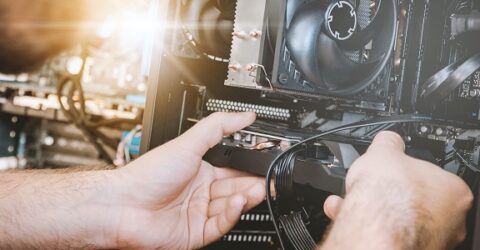Could a desktop PC last forever?
Desktop PCs are highly accessible and constructed using separate components, so can a PC last forever in the right hands?

As environmental awareness grows, we’re becoming increasingly aware of the planetary cost of new consumer goods.
Smartphone housings contain harmful microplastics, while it’s been estimated less than 16 per cent of e-waste is currently being recycled.
Electric cars require huge volumes of chemical components to manufacture their batteries, often intensively mined on far-flung continents from finite natural stockpiles.
Sealed-unit laptops routinely go to their graves once their first component fails, even if every other constituent part has years of life left in it.
However, there is one category of electronic consumer good which has been capable of outlasting the Pixels, Teslas and MacBooks of this world…
Hot desking
PCs are constructed by a variety of manufacturers, using a variety of other manufacturers’ components.
This means one part can easily be swapped for another.
Take off the small screws located at each corner of a PC tower, and the sides come away to reveal…a lot of hot air.
Desktop computers are constructed with swathes of open space to keep their components cool, which is a key reason why they tend to enjoy longer lifespans than more densely-packed laptops.
A motherboard will extend along the base or up one side of the tower, with various core components plugged into it.
These can usually be disconnected by releasing clips, pulling out a plug or undoing a few small screws.
A failed (or failing) component can be replaced with a new one without affecting other hardware plugged into the motherboard.
Which begs the question: can a PC last forever if individual components are methodically replaced as they wear out?
It’s life, Jim, but not as we know it
If you replaced every component inside a PC, it’d bear little resemblance to the device you originally bought.
Then again, that could be a positive.
Processors, graphics cards and storage modules have all undergone huge performance improvements in recent years, and will continue to do so as new hardware reaches the market.
Upgrading PC hardware is a cost-effective way to ensure a computer meets the latest software system requirements, while delivering contemporary levels of performance.
Even motherboards can be swapped out – there’s no file storage or important data saved onto it. That’s the job of the hard disc drive (HDD).
However, this sort of surgery shouldn’t be necessary. Motherboards can last for up to 20 years when properly cleaned, cooled and cared for.
Tower records
To answer our original question – can a PC last forever – the answer is theoretically yes.
However, rapid advances in computing technology mean a Noughties tower would be looking pretty archaic today, and not just because of its floppy disc drive and beige plastic housing.
There will inevitably come a time when new components are manufactured which don’t fit historic motherboards, or new connectors with no retrofitting capabilities for older machines.
Equally, components installed into contemporary towers might be obsolete in a decade. Who remembers Zip drives or CD burners nowadays?
It’s unrealistic to expect a PC to see you out, then, but a ten-year lifespan is easily achievable if you proactively respond to any signs of wear or deteriorating performance.
Periodic cleaning is also vital, since an accumulation of dust could cause components to overheat, fans to stop working properly or connectors to malfunction.
After that, the only issue you’ll face is whether you’re happy to live with a large plastic box in a world of miniaturisation and ever-shrinking component sizes…






